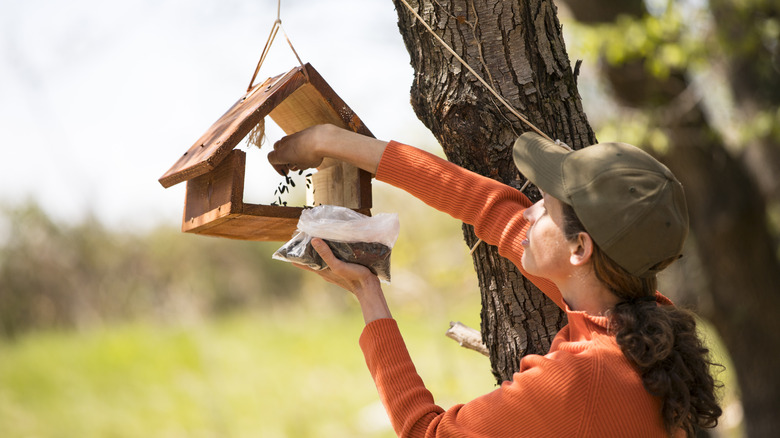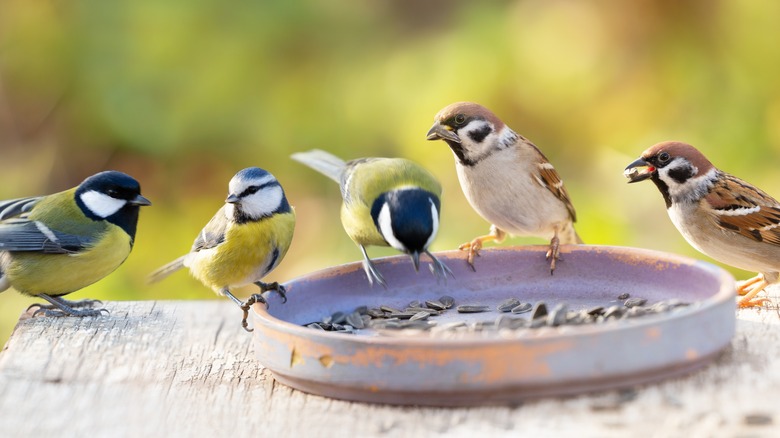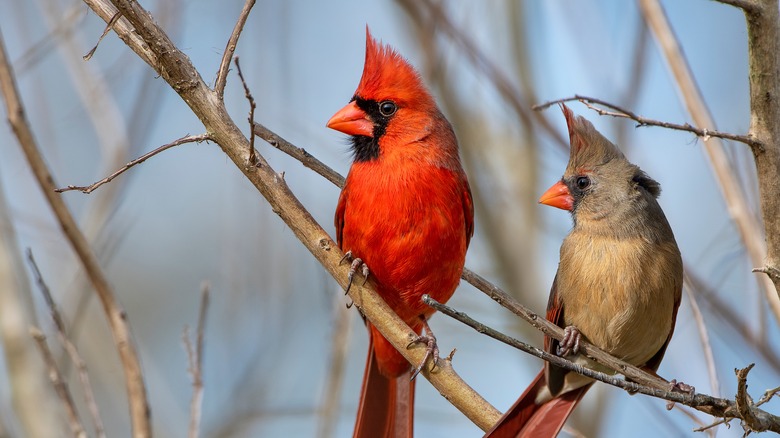How To DIY Your Very Own Bird Seed
Nothing is more enjoyable than setting out a feeder filled with food and watching a colorful menagerie of songbirds descend on it with delight. If you've filled your backyard feeder with a commercial mixture of seed, however, this image may not be the one you're experiencing. Many store-bought seed mixture varieties are loaded with fillers that your visitors won't like and offer no nutritional value. These fillers are rejected and left on the ground to spoil, attracting unwanted pests and wasting money. Creating your own mixture of bird seed is more nutritious for your feathery friends — and more economical for you. Black-oil sunflower seeds, cracked corn, and shelled peanuts are favorites among most birds, but you can even have more than one feeder with different offerings to attract certain guests.
Providing a feeder as an extra source of sustenance for birds can really make a difference in their health and wellbeing. During nesting season, birds need more calories and burn more energy when providing for their young. As they prepare for migration, an extra source of food will also help them stay nourished for their long journeys south. During the winter months when other food sources are scarce, offering your backyard visitors a nutritious variety of food will provide them with the extra energy they need to stay healthy throughout the season.
Here are the best combinations to include in your homemade bird seed mixture that will keep your feeders busy all year.
The most appealing ingredients
To begin with, never include milo seed (aka sorghum) in your homemade mixture. Commercial mixtures contain a lot of milo because it's inexpensive. However, the only birds who really enjoy it are pheasants, turkeys, and quail. These are most likely not the birds you are trying to attract to your yard! In its place, fill your bird seed mixture with plenty of sunflower seeds, a favorite of almost every bird. There are two types of sunflower seeds: black-oil and striped. Both types of seeds are high in fat and protein which are very nutritious for birds, but black-oil sunflower seeds have a thinner shell that is easy to crack open. The striped sunflower seed has a thicker shell that is harder to open, but cardinals, blue jays, chickadees, and woodpeckers will have no problem breaking it apart.
Most birds also love corn and peanuts, but these delicacies also have tough exteriors that not all birds can manage. Providing whole peanuts in a wreath feeder will appeal to large birds such as blue jays, woodpeckers, magpies, and crows, and it will be fun to watch them wrestle the nuts free. All other birds appreciate peanuts that have been shelled and chopped up, preferably ones that are roasted but not salted. Whole kernels of corn can be hard to break apart, but cracked corn that has already been chopped will attract a variety of birds to your feeder as well.
Nutrition and variety
Safflower seeds also have a hard shell and are popular with birds such as cardinals, grosbeaks, chickadees, nuthatches, and finches. The remarkable thing about safflower is that squirrels and blackbirds don't seem to care for it. That makes this seed a great choice to use in a feeder that is not squirrel-proof, such as a platform feeder. On the other hand, nyjer seed is so small that it requires a particular type of feeder that is intended to dispense this food. Goldfinches in particular enjoy nyjer seeds, as well as chickadees, doves, pine siskins, as well as other types of finches. Nyjer can spoil quickly, so take care not to leave it out too long. Mockingbirds, robins, and waxwings actually prefer fruit over birdseed, so including raisins or dried currants in your mixture will appeal to these birds. Soak the fruit in a bowl of water before setting it out for your backyard visitors, which will make it easy to eat as well as provide a source of hydration for them.
It can be fun to experiment with different combinations to see what blend is popular in your backyard. Create a general mixture of chopped peanuts, cracked corn, and black-oil sunflower seeds to appeal to a wide variety of birds. Or try offering dried fruit or whole peanuts in separate feeders, and watch to see who shows up. Any assortment of these healthy ingredients will keep your backyard busy and provide hours of enjoyment for your household.


